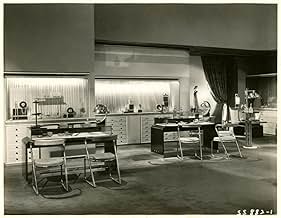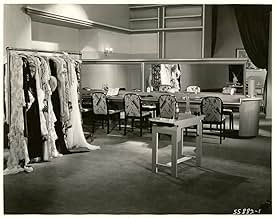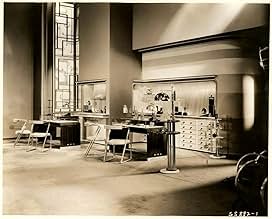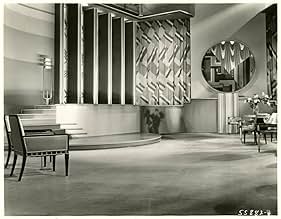A New York fashion model finds herself being pursued by a poor but honest garage mechanic and a rich philanderer.A New York fashion model finds herself being pursued by a poor but honest garage mechanic and a rich philanderer.A New York fashion model finds herself being pursued by a poor but honest garage mechanic and a rich philanderer.
Rita La Roy
- Lil
- (as Rita LaRoy)
Reginald Barlow
- Mr. Blake
- (uncredited)
Lynn Browning
- Fashion Model
- (uncredited)
Veda Buckland
- Emma
- (uncredited)
Russ Clark
- Fred Blake
- (uncredited)
Dorothy Compton
- Fashion Model
- (uncredited)
Mary Cooper
- Fashion Model
- (uncredited)
Luke Cosgrave
- Grandfather Blake
- (uncredited)
Frank Darien
- Garage Mechanic
- (uncredited)
Lillian Elliott
- Jimmie's Landlady
- (uncredited)
Muriel Evans
- Fashion Model
- (uncredited)
Featured reviews
This simple 1930s film seems to have the underlying theme that a person should be happy with their lot in life and shouldn't want more out of life--a reasonable less considering it was the Depression! When the film begins, Doris (Carole Lombard) and Jimmie (Chester Morris) are in love but to Doris there needs to be much more. This is because although Jimmie has a job, he's not exactly wealthy and she wants money and a fancy life. So, she dumps him and goes off on a search for a rich husband. Jimmie is angry and disgusted but eventually he goes looking for a rich wife. However, even though both have a cushy rich life in front of them, neither is happy.
The biggest reason to see this film is to see Cary Grant in one of his first films. He's reasonably good as a nice rich man but nothing more. As far as the story goes, I liked it but felt the fast run-time was a serious detriment. Because it went by so fast, the story felt more like an object lesson than about real people. But it still was modestly interesting and is worth a look.
The biggest reason to see this film is to see Cary Grant in one of his first films. He's reasonably good as a nice rich man but nothing more. As far as the story goes, I liked it but felt the fast run-time was a serious detriment. Because it went by so fast, the story felt more like an object lesson than about real people. But it still was modestly interesting and is worth a look.
Doris (Carole Lombard) and Jimmie (Chester Morris) have been dating for some time and pretty much everyone assumes they'll one day marry. However, when he asks her to marry him, Doris announces that she won't marry him, as she wants a man with money....and Jimmie is just a poor mechanic. They both go their own way...she as a model and he is hired as a chauffeur for a pretty rich woman. Soon BOTH end up with offers of marriage from rich folks...and hers from a man who is already married! Can either be happy without the other or living 'the good life' with the rich and powerful?
Apart from a chance to see Cary Grant in one of his early supporting roles, the film is still worth seeing. Occasionally, it comes off as heavy-handed (such as the scene that obviously telegraphs a suicide to come) and the message seems ironic considering how rich these Hollywood folks are...but it's also enjoyable and the two leads do a splendid job.
While the film only vaguely goes there, the implication is that Doris perhaps has been putting out in order to get rich and famous. Many other Pre-Code films might have made this more obvious and vulgar.
Apart from a chance to see Cary Grant in one of his early supporting roles, the film is still worth seeing. Occasionally, it comes off as heavy-handed (such as the scene that obviously telegraphs a suicide to come) and the message seems ironic considering how rich these Hollywood folks are...but it's also enjoyable and the two leads do a splendid job.
While the film only vaguely goes there, the implication is that Doris perhaps has been putting out in order to get rich and famous. Many other Pre-Code films might have made this more obvious and vulgar.
This 1932 pre-code Paramount Picture, based on a magazine story by Mildred Cram and directed by Alexander Hall, is best remembered today because it contains a bit of Cary Grant in one of the many stiff playboy roles he did before stardom. All in all, it's not much a story, entirely predictable, but as staged expertly by Hall the film does recreate visually the atmosphere of New York and Long Island society that Fitzgerald wrote about in The Great Gatsby a few years before. The actors are all particularly well-cast, down to the smallest part. (Look especially for a few moments with Anderson Lawler as a self-confessing gigolo.) Chester Morris (Boston Blackie) is for once throughly believable in a tough guy up from the streets role, but as usual it's Carole Lombard--she who could do no wrong--who steals the show and carries the picture. She's both lovely and touching and wears many a superb Travis Banton costume. A true star.
Remember all those Jean Harlow movies about poor girls wanting to marry rich fellows? If you liked them, check out Carole Lombard and Chester Morris in Sinners in the Sun. Ironically, the same year, Chester played the rich fellow in Jean Harlow's Red-Headed Woman. In this movie, he's a poor garage mechanic in love with Carole. He wants to get married, but she's afraid of a life of poverty. Given her background and growing up in the Great Depression, it's understandable.
Carole and Chester part ways in search of wealthy partners. Carole finds a married man who wants fun on the side, and Chester finds a wealthy woman who likes how he looks in a tuxedo. This pre-Code drama is a bit naughty, with see-through negligees and references to gigolos. Mostly, though, it's a tragedy about two people who think they'll be happier with money than with love. It's always a treat to see Carole in a drama, and Chester gives a great performance as he struggles with his pride. "Did you think I'd cry?" he asks, his voice breaking, when reunited with Carole after they've settled into other lives. If you like this one, check out Swing High, Swing Low.
DLM Warning: If you suffer from vertigo or dizzy spells, like my mom does, this movie might not be your friend. About 45 minutes in, and at 52 minutes in, the camera spins for about thirty seconds, and that will make you sick. In other words, "Don't Look, Mom!"
Carole and Chester part ways in search of wealthy partners. Carole finds a married man who wants fun on the side, and Chester finds a wealthy woman who likes how he looks in a tuxedo. This pre-Code drama is a bit naughty, with see-through negligees and references to gigolos. Mostly, though, it's a tragedy about two people who think they'll be happier with money than with love. It's always a treat to see Carole in a drama, and Chester gives a great performance as he struggles with his pride. "Did you think I'd cry?" he asks, his voice breaking, when reunited with Carole after they've settled into other lives. If you like this one, check out Swing High, Swing Low.
DLM Warning: If you suffer from vertigo or dizzy spells, like my mom does, this movie might not be your friend. About 45 minutes in, and at 52 minutes in, the camera spins for about thirty seconds, and that will make you sick. In other words, "Don't Look, Mom!"
A young couple's relationship is threatened by his lack of success. An enjoyable romantic drama featuring a young Carole Lombard as a fashion model - which, as this is a pre-Code movie, means lots of shots of women in lingerie - and Chester Morris as a garage mechanic who eventually marries a socialite after becoming her chauffeur. It's the kind of story that's usually treated lightly by Hollywood studios, but Sinners in the Sun has a welcome dark edge, although everyone - even a wealthy philanderer - is a little too likeable. A pre-fame Cary Grant gives notice of his star potential in a couple of scenes.
Did you know
- TriviaWilliam C. de Mille was originally assigned to direct.
- Crazy creditsThe opening credits are curtains opened by two gown clad women.
- How long is Sinners in the Sun?Powered by Alexa
Details
- Runtime
- 1h 10m(70 min)
- Color
- Aspect ratio
- 1.37 : 1
Contribute to this page
Suggest an edit or add missing content



































